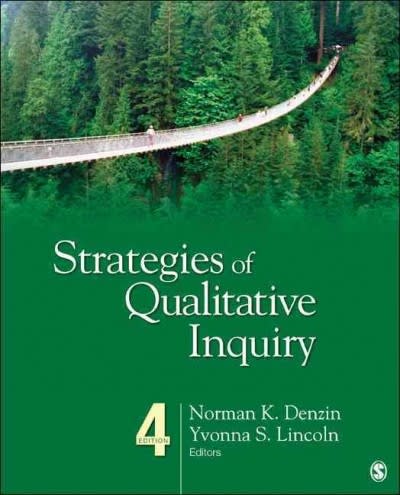Question
Question Part 1 1. However, how can researchers ensure quasi-experimental approaches in counselling research adequately handle ethical considerations like the confidentiality of participants and informed
Question Part 1
1. However, how can researchers ensure quasi-experimental approaches in counselling research adequately handle ethical considerations like the confidentiality of participants and informed consent?
2. Another example of this might be if researchers are studying new government funded programs. Researchers aiming to understand the impact of a new government benefit on the general population through quasi-experimental research might find that those in the control group believe that they werecheated out ofa chance to receive help that they could have really benefited from.
How might researchers control for perceived injustice in these types of scenarios?
3. Would it be completely ethical to deny midfulness-based interventions, if the counsellor is competent and if the client who is in the no - mindfulness intervention group would greatly benefit from receiving this intervention?
Would quasi experiments allow for more studies to be conducted on vulnerable populations? If so, how do we still ensure the ethical considerations are completely thought out and important in this study?
4. If you were looking at research for your counselling practice, do you think you would more heavily favour experimental research or non-experimental in guiding your practice? Or would you treat them similarly?
5. In your opinion, how can integratingexperimental and non-experimental Research inform counselling practice, and what are the benefits and drawbacks of doing so? How can this integration improve the effectiveness and moral implications of therapeutic interventions?
6. we discussed how common it was for media to spread information by conflating causation with correlation. How can we use the skills and knowledge gained in this course to help clients and our social contacts to become more discerning with this information as well?
Question Part 2:
1. My question here following through these discussions on this forum is, in light of the acknowledgement, oversimplification and potential confounding variables, how can researchers refine study designs to capture the intricate interplay between genetic and environmental factors in the context of shyness, ensuring a more nuanced and comprehensive understanding?
2. in light of the acknowledgement, oversimplification and potential confounding variables, how can researchers refine study designs to capture the intricate interplay between genetic and environmental factors in the context of shyness, ensuring a more nuanced and comprehensive understanding?
3. Any ideas on how to control for improved self-esteem mimicking a decrease in depressive symptoms as a result of weight loss?
4. The case outlined is small, increasing the potential for an outlier result causing a type I error, are there ways for us to account for this without having a larger sample?
5. What benefit would this information offer for our small study? would this be considered a potential pilot study for a larger empirical question?
6. I am having difficulty grasping how correlation could be related to this specific scenario. What would a negative correlation for either case imply? How might this data be interpreted on a graph? Could a scatterplot be used?
7. What ethical considerations should researchers keep in mind when collecting data on sensitive topics such as personality traits, especially in the context of children and families?
Step by Step Solution
There are 3 Steps involved in it
Step: 1

Get Instant Access to Expert-Tailored Solutions
See step-by-step solutions with expert insights and AI powered tools for academic success
Step: 2

Step: 3

Ace Your Homework with AI
Get the answers you need in no time with our AI-driven, step-by-step assistance
Get Started


